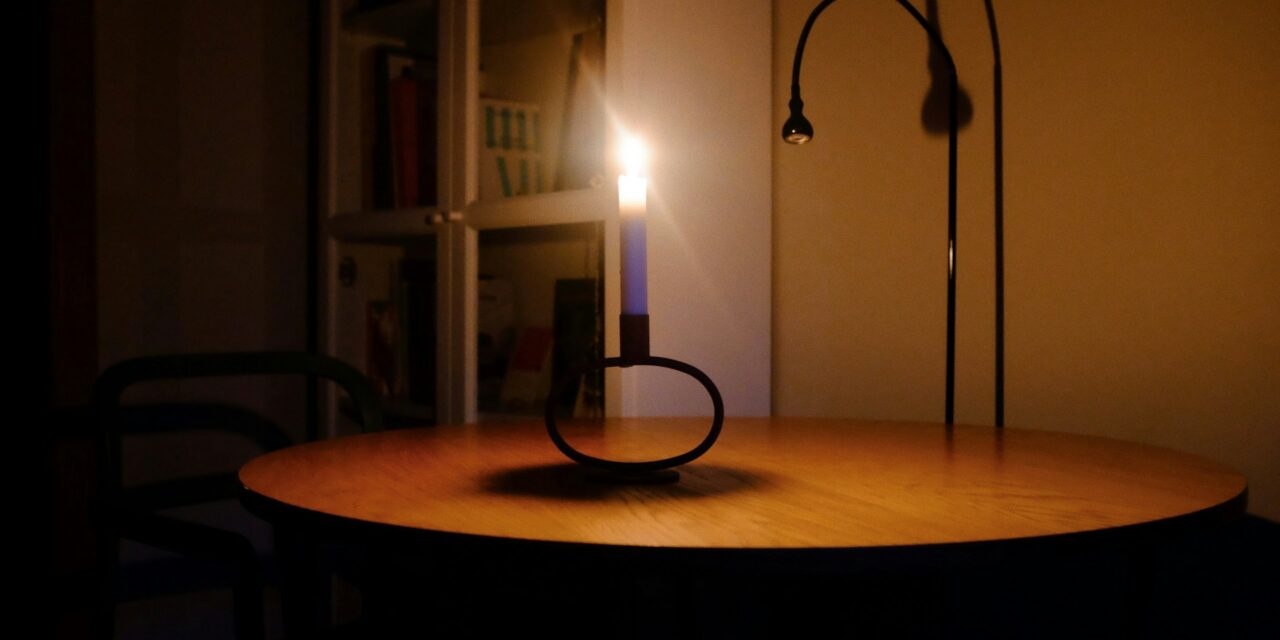Discover essential blackout tips specifically crafted for highly sensitive people. Learn practical preparations, calming strategies, and survival skills to navigate power outages confidently and calmly.
Estimated reading time: 8 minutes
If you’re anything like me, you’ve probably noticed how quickly anxiety can spike when unexpected things happen: especially something as significant as a blackout. With recent events, like the temporary blackout in Spain and Portugal, it’s become clear that these aren’t just hypothetical situations anymore. They can genuinely happen to us, too. Seeing these events unfold made me realize how important it is to be prepared, especially as someone who’s highly sensitive and tends to feel everything more deeply. In this article, I’ll share some blackout tips to help you feel more prepared in case of an emergency state in your country.
What You’ll Learn About Blackout Tips:
- How Likely is a Blackout to Happen?
- Our Lost Connection to Basic Survival Instincts
- Essential Blackout Preparation Tips
- How to Behave During a Blackout
- Self-care Tips for Highly Sensitive People During a Blackout
- What if a blackout lasts longer than 3 days? What happens then?
- What are Your Best Blackout Tips?
How Likely is a Blackout to Happen?
Now, you might be thinking, “Okay, but how likely is this really?” Honestly, while our modern power grids are robust, they’re also surprisingly fragile under certain conditions: like extreme weather events, technical issues, or cyber threats. When I saw news about the recent blackout in Spain and Portugal, it was a gentle yet powerful reminder that no system is foolproof. Even though that blackout was thankfully brief, the situation highlighted a crucial point: it’s always better to be prepared than caught off guard, especially when our peace of mind depends on it.

Our Lost Connection to Basic Survival Instincts
Lately, I’ve been reflecting deeply on how far removed we’ve become from our basic survival instincts. This thought genuinely scared me a bit because we’ve grown incredibly dependent on the internet, Google, and AI for almost everything. Previous generations had skills like gardening, growing their own food, sewing clothes, handling basic wounds, and identifying healing herbs. Now, most of us don’t have these essential skills. It made me realize how vulnerable we truly are without these basic abilities and how important it is to reclaim some of this forgotten knowledge. Knowing even just a bit more about self-sufficiency can provide a profound sense of security and empowerment.
Essential Blackout Preparation Tips
I started looking deeper into blackout preparation because, let’s face it, government recommendations can be a bit basic. You’ve probably already heard the typical advice: have a battery-operated emergency radio, stock up on water, and keep non-perishable food around. These are good starting points, but they barely scratch the surface of true readiness. Here are some more detailed blackout tips to feel more prepared:
1. Alternative Sanitation Methods
Something I learned recently that truly shocked me was the sanitation issue during prolonged blackouts. We tend to assume toilets will still function if we manually flush them with water with a bucket, right? Well, here’s the catch: during a blackout, sewage plants often stop operating effectively. This can lead to gases backing up into our homes, which honestly sounds terrifying to me. A practical tip I found helpful was to seal your toilet lids with strong tape. Consider using a portable camping or chemical toilet as an alternative. If those aren’t accessible, dig a hole in your backyard to safely dispose of waste (for instance in a biodegradable bag). It might feel awkward or old-fashioned, but it’s safer and more practical than risking hazardous conditions inside your home.
2. Stock Up on Essential Medications and First Aid Supplies
As a highly sensitive person, health anxiety can spike quickly. Imagine the added stress if your essential medication runs out during a blackout. Keep an extra stash of your vital medications and a well-stocked first aid kit handy. This kit should include basics like antiseptics, pain relievers, bandages, and even some calming herbal remedies like chamomile tea or lavender oil to ease anxiety and stress naturally.
3. Lighting and Warmth
One thing I’ve learned is that darkness can significantly amplify anxiety, especially for sensitive folks like us. Make sure you have a variety of light sources: solar-powered lanterns, candles, headlamps, and plenty of extra batteries. Equally crucial, especially in colder seasons, are blankets, sweaters, and thermal clothing to keep warm if heating becomes unavailable. Just the feeling of warmth and light can dramatically ease anxiety during unsettling times.
4. Backup Power and Charging Options
Honestly, we are so reliant on our phones for information and comfort that the thought of losing contact is unsettling. Keep several power banks fully charged, and consider investing in solar-powered chargers. Knowing you can stay connected, even minimally, can offer a massive emotional comfort boost during prolonged outages. However, consider that network services might also not work during a blackout. Something to keep in mind.
How to Behave During a Blackout
When everything suddenly goes dark, it’s natural to feel panic rising. By reading more about blackout tips, I’ve learned that having a clear plan helps immensely in reducing stress:
Stay Informed and Connected
Always have a battery-powered or hand-crank radio to stay updated on emergency broadcasts. Keeping informed will significantly ease your mind. Also, conserve your phone battery by limiting usage to essential communications only.
Minimize Energy Usage
During a blackout, if you have a backup generator, conserving your resources is vital. Therefore, use any backup power sparingly. Prioritize critical devices and unplug anything unnecessary to preserve your limited power sources.
Stay Indoors if Possible
Venture outside as little as possible during a longer blackout. Streets can become unsafe quickly, and emergency services might be overwhelmed. Create a safe, calm indoor environment instead, which will help manage your anxiety better.
Self-care Tips for Highly Sensitive People During a Blackout
We highly sensitive folks often carry heightened anxiety, especially during unpredictable situations. Here’s how you can manage stress during blackouts:
1. Establish a Calm Environment
During a blackout, surround yourself with familiar comforts. Create a little haven with your favorite blankets, pillows, and comforting scents. Lighting some candles or turning on your solar lamps can provide a calming, gentle atmosphere while you’re waiting for updates.
2. Mindfulness and Breathing Exercises
Deep breathing and mindfulness have been lifesavers for me during stressful moments in the past. Try the 4-7-8 breathing method now, so you can remember it in case of a blackout to calm down: breathe in for 4 seconds, hold for 7 seconds, and exhale for 8 seconds. Simple meditation or mindfulness exercises can also help ground you when anxiety peaks.
3. Engage in Creative or Calming Activities
Use the downtime to engage in activities that bring you joy and calm. Whether it’s drawing, journaling, or reading a good book by candlelight, these activities can provide much-needed emotional comfort and distraction.
4. Stay Connected with Loved Ones
Feeling connected to others can greatly ease feelings of isolation or panic. If your family or friends live nearby, even brief, reassuring conversations with family or friends can significantly boost your emotional well-being during stressful times.
5. Maintain a Positive Outlook
Lastly, remember that most blackouts are temporary. Keeping this perspective can significantly reduce anxiety. Remind yourself, “This too shall pass,” helping you stay grounded and focused on the present.
What if a blackout lasts longer than 3 days? What happens then?
It’s natural to feel a bit anxious considering the possibility of a blackout lasting longer than a few days. First off, remember to take deep breaths and reassure yourself that staying calm is your greatest tool in challenging situations. For extended outages, it’s important to have a sustainable plan: ration your food and water carefully, focusing on non-perishable and nutrient-rich items. Consider learning basic skills like cooking over an open flame safely, growing small-scale edible plants, and identifying edible wild plants if you have a yard or garden area. Building relationships with neighbors or a community group beforehand can also provide invaluable support during longer emergencies. Remember, humans are incredibly resilient, especially when we help each other. Keeping a clear, calm head and focusing on practical actions will significantly increase your comfort and security during extended blackouts.
What are Your Best Blackout Tips?
Preparing for a blackout isn’t about fueling fear; it’s about empowering yourself with knowledge, practical solutions, and emotional tools to handle uncertainty gracefully. As highly sensitive souls, our strength lies in our preparedness and self-awareness. By embracing these practical preparations and gentle self-care practices, we can navigate blackouts, or any other unforeseen events, with confidence, resilience, and calm.
What are your best blackout hacks for highly sensitive people? Feel free to share them in the comments and let’s help each other!
You May Also Enjoy Reading These Articles
Just a little heads up: some of the links in this blog are affiliate links, which means if you click on them and make a purchase, we may earn a small commission at no additional cost to you. 😊
We only recommend products and services we genuinely believe in and have personally used or researched. Your support through these links helps us keep bringing you valuable content, so thank you for being amazing!
In this article, we collaborated with AI, meaning that the input and stories are original human ideas, but the text itself has been created with support from AI. All AI content is being edited and factchecked by our editor.







